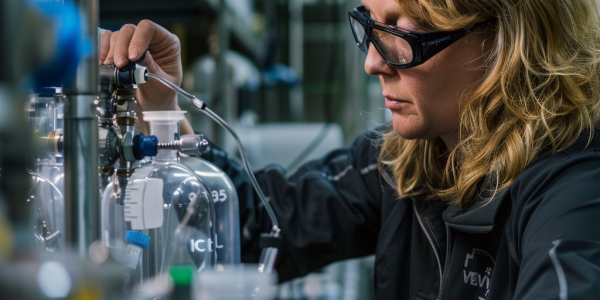Ancient Log Discovery Offers New Hope for Climate Change Mitigation
A groundbreaking study reveals that a 3,375-year-old Eastern red cedar log has the potential to transform climate change strategies by showcasing the effectiveness of wood vaulting, a method that preserves carbon storage even after trees die. This discovery highlights the importance of innovative solutions in carbon sequestration and the need for reevaluating tree planting initiatives in the fight against climate change.
Groundbreaking Discovery of Carbon-Carbon One-Electron σ-Bond
A groundbreaking study reveals direct evidence of a carbon-carbon one-electron σ-bond, a significant milestone in chemistry. This discovery, achieved through advanced techniques like X-ray diffraction and Raman spectroscopy, validates theoretical predictions and opens new avenues for research in chemical bonding and material development.
Indonesia Embraces Carbon Capture Technology to Extend Fossil Fuel Use
Indonesia’s focus on Carbon Capture Storage (CCS) technology is set to extend the use of fossil fuels while reducing greenhouse gas emissions. Saleh Abdurrahman from BPH Migas highlights the potential of CCS in achieving the nation’s net-zero emissions target by 2060. As natural gas becomes increasingly vital in Indonesia’s energy transition, CCS could position the country as a leader in sustainable energy practices, balancing economic growth with environmental sustainability.
Microscopic Fungi Enhance Soil Carbon Storage in Newly Formed Arctic Landscapes, Study Finds
Recent study by researchers at Queen Mary University of London reveals how microscopic fungi enhance soil carbon storage in newly formed landscapes resulting from the shrinking of Arctic glaciers. The colonization of microorganisms in exposed areas plays a crucial role in soil formation, offering significant carbon stores under specific conditions. Dr. James Bradley’s team’s findings, published in Proceedings of the National Academy of Sciences, shed light on the complex processes involved in post-glacial soil formation in Arctic regions.
Revolutionary Carbon Capture Technology Freezes CO2 in Ocean Faster and Safer
A breakthrough study from The University of Texas at Austin introduces a revolutionary carbon capture technology that freezes carbon in the ocean faster and safer than ever before. This chemical-free method accelerates the conversion of CO2 into hydrates for ocean storage, providing a more efficient and eco-friendly alternative to traditional injection. Lead researcher Vaibhav Bahadur highlights the importance of this innovative solution in combating climate change by rapidly sequestering carbon dioxide in the ocean, preventing its release back into the atmosphere. Published in ACS Sustainable Chemistry & Engineering, this research signifies a significant advancement in carbon capture technology with the potential to address the challenges of global warming and enhance climate resilience.
Challenges in Achieving $100 per Ton for Carbon Removal Technology
Climeworks AG claims to have made a breakthrough in reducing the cost of extracting carbon from the air, potentially cutting it by up to 50%. Despite this, the current cost of carbon capture remains above the industry’s target for widespread adoption. Industry leaders once aimed for $100 per ton, but inflation and real-world challenges have cast doubt on achieving this goal. Climeworks now projects a cost of $250 to $350 per ton by 2030, while the current average is around $715 per ton.
China’s Carbon Emissions Show Signs of Decline
Recent data suggests a potential decline in China’s carbon emissions, marking a significant shift in the country’s environmental impact. After a surge in carbon-dioxide emissions in 2023, there has been a noticeable decrease in emissions, signaling a possible peak in 2023 and a downward trajectory. This development is crucial in the global fight against climate change and could set a new precedent for other nations to follow in reducing their carbon footprint.
Revolutionary Approach to Reusing Captured Carbon Developed by Georgia Tech Engineers
Engineers at Georgia Tech have developed a groundbreaking approach to reusing captured carbon, making it more cost-effective and energy-efficient. Their new electrochemical reactor seamlessly integrates into direct air capture systems, transforming CO2 into valuable raw materials like plastics, chemicals, and fuels. This advancement significantly reduces costs and energy demands, enhancing the viability of combating climate change. The innovative design eliminates the need for expensive separation processes, streamlining the carbon capture process and reducing associated costs.
Animals Play Crucial Role in Carbon Storage, Study Suggests
A new study suggests that animals play a crucial role in carbon storage, potentially enabling ecosystems to store two to three times more carbon. Matteo Rizzuto from Yale University highlights how animals contribute through activities like trampling, grazing, and bodily functions. This new perspective challenges previous assumptions about carbon dynamics, emphasizing the importance of preserving the relationships between species for conservation and climate change mitigation.
Venus Experiencing Loss of Gases in Upper Atmosphere, Study Finds
A new study has revealed that Venus is experiencing a loss of gases such as oxygen and carbon from its upper atmosphere. The research, published in the Nature Astronomy journal, highlights the findings from the Mercury-bound BepiColombo spacecraft’s second fly-by of Venus in August 2021. These recent revelations add to the existing knowledge about Venus, raising questions about the potential implications for Earth and prompting further exploration of Venus to better understand these phenomena.










